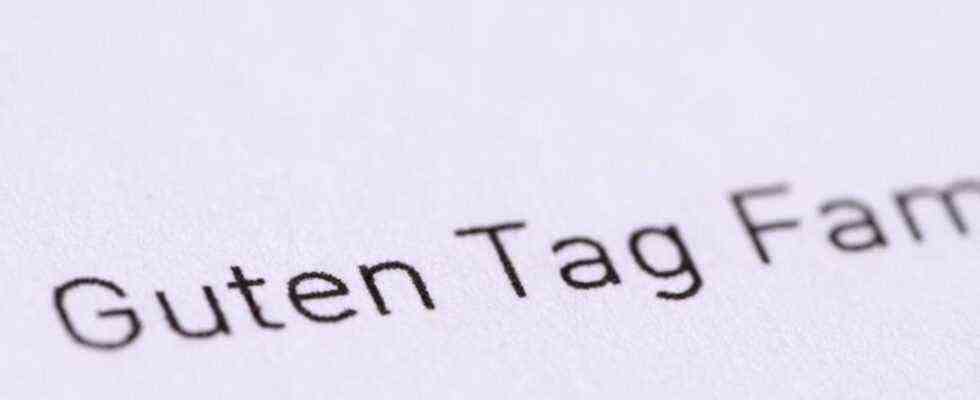language
From Yours sincerely to LG: The business letter is looser
Greetings such as “Hello, family…” are also becoming more common in business mail. Photo: Bernd Weißbrod/dpa
© dpa-infocom GmbH
More and more companies are doing without traditional formalities in letters and e-mails. However, this opens up new pitfalls. And gender-sensitive language is becoming more important.
Corporate bosses appear in sneakers, companies address their customers on first-name terms without being asked – the style of communication in business has changed. “The reduction of formalities corresponds to the zeitgeist,” says management consultant Jana Völkel-Kitzmann.
But this also opens up new pitfalls: “How do I not step on anyone’s toes?” Audi boss Markus Duesmann, for example, could be written to “Dear Mr. Duesmann” and close the letter “With the utmost respect” or “Best regards” – that’s what the protocol experts at the Federal Ministry of the Interior suggest in their guide. However, Audi has been gradually introducing gender-sensitive language since March 2021. “When we address people, we usually only use first and last names and begin letters or e-mails to customers with, for example, “Hello, first name, last name” or “Dear Audi customers” and refrain from gender-specific information,” explains a spokeswoman in Ingolstadt.
Audi is therefore one of the pioneers. “Many companies from a wide variety of industries – including large corporations – have since contacted us about our experiences,” says the spokeswoman.
The old formulas do not disappear completely
The Haufe Academy also reports great interest in its training seminars: “The topic of gender, how do I choose the politically correct way of addressing it, is currently given very high priority by all participants, especially from the banking, insurance and government sector, and is thus becoming a everyday standard,” says a spokesman.
“Dear Sir or Madam”, can an e-mail or a letter still start like this? The previous forms are used less, but they are not going away, says Völkel-Kitzmann from the Management Institute Kitzmann. Colloquial salutations, such as are common on Whatsapp and Tiktok, are increasingly appearing in emails and letters. But: “Business partners should not be written to with moin moin or hej, but politely and respectfully if you communicate professionally,” says the consultant. “In any case, it is tactless to address someone by their first name without being asked, as in advertising at the bus stop. Young employees may take this from social media.” Not everyone wants to be spoken to like that.
Correspondence consultant Claudia Marbach is often asked in her seminars whether a salutation or salutation is wrong. “It’s not wrong as long as there are no spelling or grammatical errors. It might just be unoriginal, maybe boring, bland, complicated, distant,” she says. “And you can have different opinions about that. Everyone feels that differently.” It is crucial to “communicate appreciatively, respectfully and positively”.
Depending on the industry, the tone is different
If formal forms of address and salutations are to be replaced by individual, personal ones, but time is short, a short “Hello” in e-mails and at the end a “LG” must sometimes be sufficient. Marbach doesn’t think it’s possible: “If you want to send greetings, you can also take the time to write out the words,” she says. “When my husband says “I love you”, I don’t say “ditto” just because it’s faster.”
The style also depends on the industry. The tone is more conservative in banks and insurance companies, while it tends to be more relaxed in the technology, sports and fashion industries. But “relaxed doesn’t necessarily mean good, positive, respectful or appreciative. Looser is not necessarily better,” says Marbach. “For example, I think it’s offensive when my mobile phone provider uses the familiar name in emails: “Hello Claudia””.
The tightrope walk between classic and original, distant and pandering, dowdy and brash requires a sure instinct. Some would like to see more binding manners again. At the Haufe Academy, “we sense a strong demand for support in formal communication to the outside world,” says their spokesman. “Many customers now want to strengthen the style and form of official business communication again and standardize it across the company.”

